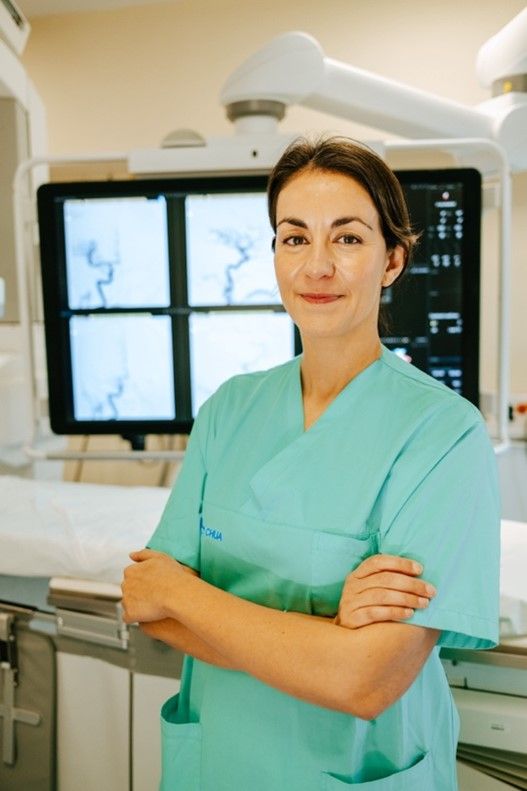More than 80% of strokes are caused by a blood clot that blocks an artery in the brain, cutting off the oxygen supply to that region. The main risk factors - such as high blood pressure, high cholesterol, smoking, physical inactivity, and poor diet - are increasingly common. However, healthy and younger individuals can also suffer a stroke due to undiagnosed heart conditions, stress, or as a side effect of certain medications.
Over the past decade, stroke treatment has undergone remarkable advances. What was once limited to intravenous thrombolysis—a medication that dissolves blood clots—has evolved into a more comprehensive and highly effective combined therapy. Today, the gold standard in stroke care includes clot-dissolving medication followed by a minimally invasive procedure known as mechanical thrombectomy. In this procedure, highly trained specialists in interventional neuroradiology insert a catheter through the groin or wrist and guide it to the brain. Injection of iodinated contrast enables the physician to create a roadmap of the arteries, making it possible to safely navigate through them and identify the exact occlusion site. The clot is then removed using an aspiration catheter only or combined with a tiny stent-like device called a stent retriever. Once blood flow is restored to the affected brain area, the chances of a full recovery improve dramatically.
The Algarve Local Health Unit is fully equipped to handle these cases. A dedicated neurointerventional team is available 24/7, working in close collaboration with the Emergency Department and Stroke Units to ensure patients receive the best possible care.

In stroke medicine, you'll often hear the phrase "Time is Brain." This underscores the importance of recognising the early signs of a stroke and acting quickly. Symptoms such as sudden weakness, confusion, difficulty speaking, vision loss, or a severe headache require immediate attention. Calling the national emergency number (112) and activating the National Pre-Hospital Emergency System (INEM) can significantly reduce the chances of severe disability or even death.
At the hospital, stroke specialists will perform an urgent clinical assessment followed by a brain scan to rule out hemorrhagic stroke (bleeding in the brain). If no contraindications are found, intravenous thrombolysis is administered, and the patient is quickly transferred to the state-of-the-art angiography suite at Faro’s University Hospital, where the neurointerventional team is ready to perform the thrombectomy procedure.
Thanks to the continuous development of stroke care in the Algarve, patients can count on fast, specialised, and life-saving treatments close to home. Raising awareness about symptoms and acting without delay can make all the difference—not only in survival but in preserving quality of life. Knowing what to do might save your life or the life of someone you love.
For more information, please contact Algarve Biomedical Center on (+351) 289 800 065.














